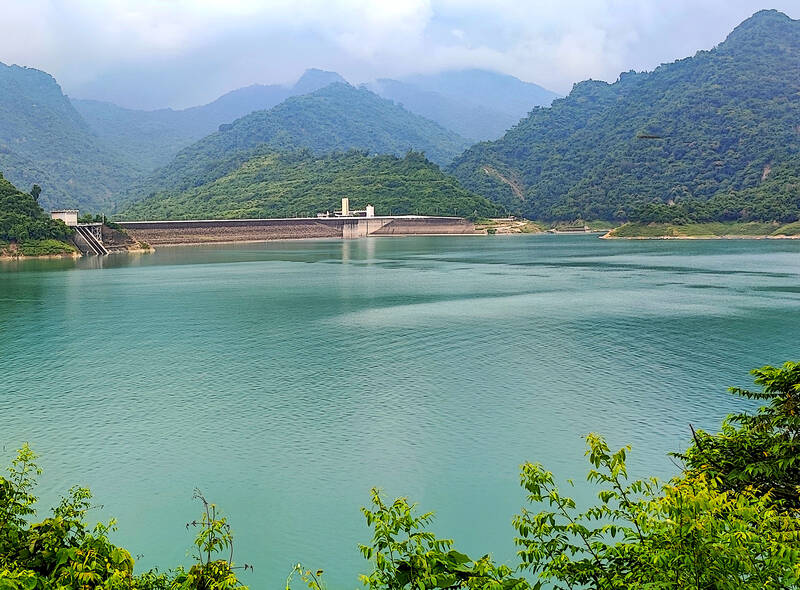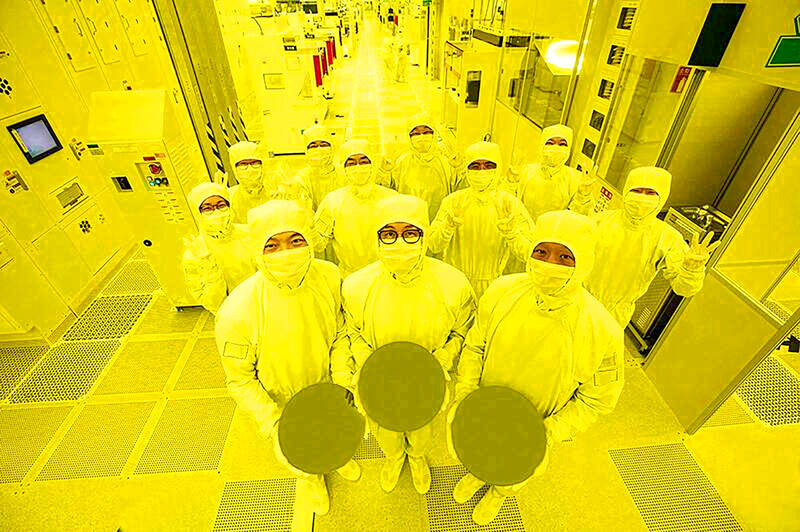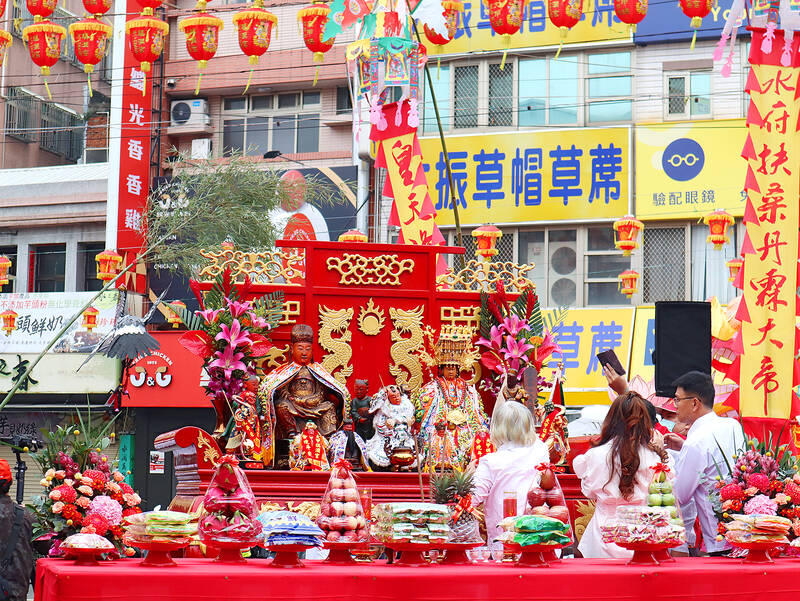Taiwan Plus (@taiwanplusnews), the excellent English-language media outlet, reported last week that water levels were down in Taiwan’s largest reservoir as the nation’s dry season looms. The northern reservoirs may be brimming, but the rains have neglected the south, forcing the nation’s water bureaucracy to scramble to maintain supplies without rationing.
Almost a metaphor for the nation’s political geography.
There’s no little irony in this happening on the heels of a business-as-usual election in which all incumbents were re-elected. That construct we misleadingly label “mother nature” is sending us another tranche of signals telling us that business as usual is on a collision course with the future. We won’t listen, of course.

Photo: Wu Chun-feng, Taipei Time
After two decades of repeated water shortages, and annual flirtation with dry reservoirs, business as usual remains the dominant mode of institutional governance. Water and electricity prices are far too low. Roads are still being built at a frenetic pace. Renewable energy implementation limps along.
Land development remains the sacralized practice of Taiwan’s developmentalist religion, mediated through the priestly class of construction firms, and missionized to the public by the acolytes of the real estate industry. The answer to economic problems? More land development, of course: the government last month announced another round of high-tech industrial districts focused on key future technologies. Just business as usual.
No current city leader will challenge the construction-industrial state. They all know what happened to Chinese Nationalist Party (KMT) mayor Jason Hu (胡志強) of Taichung when he angered political factions over land on the west side of town, and to his Democratic Progressive Party (DPP) successor, Lin Chia-lung (林佳龍), when he made a few tepid moves on the illegal factory issue.

Photo: Wei Kuo-chin, Taipei Times
Look past the mayor and magistrate elections at the towns and townships. A longtime journalist here noted in a private communication that, for all 204 township seats, including the six “orphaned” city indigenous seats, there were head-to-head contests between the DPP and the KMT in only 40 (19.6 percent). All other contests featured a slew of independents against a candidate from one of the major parties. Outside the major cities of Hualien and Taitung the DPP ran no candidates.
At the borough warden level the parties are even less visible. Central Election Commission numbers show that over 80 percent have no party identification. I spoke with a longtime researcher into the borough warden system, who observed that they are wary of revealing their political attitudes, since that may have costs. Since they are not part of a public assembly with public votes, they do not need the support of fellow party members to get things done. Also, the village and district leadership above them contains large numbers of independents.
One reason the DPP lost so many races is hidden in those numbers: no local presence. The DPP is a layer of elected officials in visible posts, like the glaze on a Christmas ham, a thin veneer over a whole lotta pork.

Photo: Ou Su-mei, Taipei Times
The gods of desperately needed progress sent us another sign this week with reports that Taiwan’s road deaths had already passed 2,000 this year. The Ministry of the Transportation said it would institute real road training for scooter drivers and post signs and lights at dangerous intersections, especially for older drivers, who cause a disproportionate amount of accidents.
This happens every year, and such training had been proposed for years in countless forms, but always, business as usual won out. When I think of drivers’ training, I always think of the very nice people at a place I knew, who affixed pins and strings to the windows of a trainee’s car to offset her vision problems so that she could refer to them when she tested for her license on the closed course. She passed.
Naturally, despite years of research and experience of countless cities around the world, no one has proposed reducing vehicle deaths by the simple expedient of banning cars from city centers. Who could get elected on a sensibly insane proposal like that?
Our business as usual electorate looks up at the illegal rooftop construction on every small building and asks if reform will sweep that away. It wonders, if there is a crackdown on gangs, what will happen to the services it uses regularly, and whether fourth uncle will go to jail because of his connections. What will happen to water prices? Electricity prices? Car taxes? Land taxes? Our ability to evade taxes? Health insurance? The value of my house?
Does the public want progress, reform and change? Yes, as long as it happens to someone else.
Political scientist Austin Wang (王宏恩) observed in a piece at The Initium that his analysis showed that most of the votes the DPP lost from 2020 were in districts with a higher proportion of college graduates and higher population density.
Those are precisely the areas where one might expect people to have more progressive attitudes. This suggests that another reason the DPP lost is that it has attempted to become a status quo party in a nation where the KMT is already the professional occupant of that niche, entrenched in local faction and business networks. The restless, out-migrating young often complain that the DPP is too close to business.
The social welfare policies long advocated by pro-Taiwan activists in the Martial Law era have now become national policy. Instead of moving forward by offering another round of progressive programs, the DPP reflexively groped for business as usual.
But, DPP insiders might well respond, what else can we do with this electorate?
The DPP’s desperation turn to drum up Taiwanese nationalism by hyping the China threat was nullified, as Wang noted in a nifty piece at The National Interest (Was China the Winner of Taiwan’s Elections?, Nov. 30): “anti-China sentiment has become the consensus in Taiwan, parties and candidates cannot differentiate themselves on this issue.” That too is now business as usual
Longtime commentator Courtney Donovan Smith observed that this inept nationalist turn simply handed China a propaganda victory. I should add that it also showed that the public may well regard KMT assurances that Taiwan must be defended as credible, and thus, in the 2024 election the KMT need merely make a few noises in that direction to get elected. Current and popular New Taipei City Mayor Hou You-yi (侯友宜) will be a very dangerous opponent in 2024, armed with this knowledge.
Especially with this business-as-usual electorate.
Notes from Central Taiwan is a column written by long-term resident Michael Turton, who provides incisive commentary informed by three decades of living in and writing about his adoptive country. The views expressed here are his own.

In the March 9 edition of the Taipei Times a piece by Ninon Godefroy ran with the headine “The quiet, gentle rhythm of Taiwan.” It started with the line “Taiwan is a small, humble place. There is no Eiffel Tower, no pyramids — no singular attraction that draws the world’s attention.” I laughed out loud at that. This was out of no disrespect for the author or the piece, which made some interesting analogies and good points about how both Din Tai Fung’s and Taiwan Semiconductor Manufacturing Co’s (TSMC, 台積電) meticulous attention to detail and quality are not quite up to

April 21 to April 27 Hsieh Er’s (謝娥) political fortunes were rising fast after she got out of jail and joined the Chinese Nationalist Party (KMT) in December 1945. Not only did she hold key positions in various committees, she was elected the only woman on the Taipei City Council and headed to Nanjing in 1946 as the sole Taiwanese female representative to the National Constituent Assembly. With the support of first lady Soong May-ling (宋美齡), she started the Taipei Women’s Association and Taiwan Provincial Women’s Association, where she

Chinese Nationalist Party (KMT) Chairman Eric Chu (朱立倫) hatched a bold plan to charge forward and seize the initiative when he held a protest in front of the Taipei City Prosecutors’ Office. Though risky, because illegal, its success would help tackle at least six problems facing both himself and the KMT. What he did not see coming was Taipei Mayor Chiang Wan-an (將萬安) tripping him up out of the gate. In spite of Chu being the most consequential and successful KMT chairman since the early 2010s — arguably saving the party from financial ruin and restoring its electoral viability —

It is one of the more remarkable facts of Taiwan history that it was never occupied or claimed by any of the numerous kingdoms of southern China — Han or otherwise — that lay just across the water from it. None of their brilliant ministers ever discovered that Taiwan was a “core interest” of the state whose annexation was “inevitable.” As Paul Kua notes in an excellent monograph laying out how the Portuguese gave Taiwan the name “Formosa,” the first Europeans to express an interest in occupying Taiwan were the Spanish. Tonio Andrade in his seminal work, How Taiwan Became Chinese,